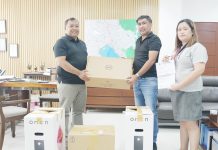TACLOBAN CITY – The Catholic Relief Services (CRS) committed to assist the Department of Agrarian Reform (DAR) in helping out agrarian reform beneficiaries (ARBs) in heavily-damaged agrarian reform communities (ARCs) in Eastern Visayas rise from being shattered by super-typhoon “Yolanda”.
About eight ARCs in Leyte and Eastern Samar provinces covering nine pilot barangays, according to DAR Regional Director Eliasem Castillo, have already been validated by the CRS and included in their list which will benefit more than 4,000 farmers.
These areas, he added, are in Barangay San Jose in Palo; Barangay Lapay in Tanauan; and Barangays Malbog and Capangihan in Tolosa, all in Leyte province.
In the province of Eastern Samar the areas are in Barangay Coticot in Giporlos; Barangay Bulusao in Lawa-an; Barangay Sta. Rosa in Balangiga; Barangay Labtic in Quinapondan; and Barangay Siguinon in Salcedo.
Castillo said that this non-government organization (NGO) readily responded to their call to include ARCs in their assistance operation in the process of DAR’s preparation of the restoration and rehabilitation plan for these areas.
However, it was emphasized by CRS operations manager Terry Tuazon, that they will only be assisting farmers in coconut areas to avoid duplication of similar aid extended by other organizations to rice farmers.
Tuazon explained that in order for these farmers to be able to start rehabilitating their lots, CRS will provide financial assistance in clearing out debris brought by the typhoon.
The farmers are required to form into groups with 15 members and help one another clear (and plant if seeds/seedlings are available) 15 lots in 15 days.
Each farmer will be paid P3,900 for the 15-day work at P260 per day.
In addition, Tuazon said, each farmer will also get a P1,000 worth of voucher that could be used in procuring farm tools, seeds/seedlings and fertilizers at accredited stores.
Earlier, Castillo said, PCA has committed coconut seedlings and camote cuttings for the rehabilitation of typhoon-ravaged areas.
But Tuazon said that farmers could also plant vegetables as intercrops to coconuts for additional income.
Meanwhile, DAR’s Bureau of Agrarian Reform Beneficiaries Development (BARBD) Assistant Director Ma. Elena Cabañes introduced to the ARB organizations in these ARCs the vermiculture as additional livelihood for them where they can recycle the debris as feeds for the worms thru a shredding machine.
If the farmers would be interested, DAR will provide 30 kilos of worms for every ARC and facilitate the sourcing out of the shredding machine from an international organization. (JOSE ALSMITH L. SORIA)



